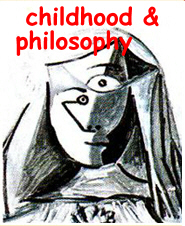the participation of philosophy in an ethics and politics of joy
Abstract
Abstract: This paper finds its inspiration in the work of the seventeenth century philosopher Benedict de Spinoza. My objective is to briefly examine three crucial aspects of Spinoza’s philosophy which are not only extremely useful to our understanding of philosophy for children but also inspirational as they challenge some of our ingrained modes of thinking and create space for new relations with knowledge, others and the self. Firstly, Spinoza’s relational ontology allows us to perceive ourselves as moments in a process of integration. In his philosophy, the understanding of connectedness is crucial to the expansion of our powers or activity. I thus suggest that the collective practice of philosophy can contribute to the enhancement of rational systems of sociability in which the understanding of connectedness is crucial. Secondly, reason and affectivity are not separate in Spinoza’s philosophy. Our power to think and affect is directly associated with our power to be affected or our openness to others. These first two aspects are also directly associated with his ethical and political project. Since, for Spinoza, joy is the passage from a lesser to a greater power to act, and virtue is equated with activity, I argue that the collective practice of philosophy can be understood in this perspective as essentially joyful, in a political and ethical sense: it increases one’s powers through the increase of power also experienced by others. Key Words: Spinoza; relationality; power to affect and be affected; reason and affectivity.Downloads
Download data is not yet available.
Downloads
Published
2010-04-27
Issue
Section
articles



